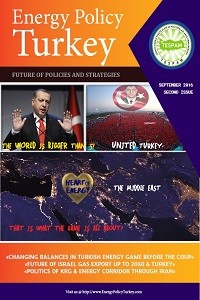Abstract
Despite its small population and territory, Israel is one of the most influential
countries in the region. This is mostly due to global lobbying achievements, strong
economy, high technology and military products, having support of ultra-rich
Jewish people around the world and additionally being a natural strategic
partner of USA.
Until the last decade, Israel’s name could not be associated with energy
resources although she has owned the same features above and the strong influence
in the region. After some discoveries such as Tamar, Leviathan, Tanin and
Karish inside its offshore boundaries, Israel has started to be introduced as
the future’s important gas exporter in the region.
From the sight of international affairs between Turkey (who is also
another strategic partner of USA) and Israel; after the 2009 Davos statements
of the Turkish President (as a result of Israel’s cruelties in Palestine) and Mavi
Marmara irruption of Israel, relations come to a rupture.
After the end of 2015, while Turkey’s relations were strained with
Russia and naturally, gas import security raised alerts. And by adding this
situation some other political reasons, Turkey and Israel have taken steps
forward to reestablish good relations (by the way, it has been claimed that
Israel also needs Turkey for an economic gas export to the due markets).
Before the coup, Israel has agreed to pay compensations to the families
of the Mavi Marmara victims. And after the coup, this step and other due items have
been negotiated and accepted by both governments.
With this alteration in the affairs between Israel and Turkey, energy,
as it is stated, has become the most important issue that prepared both sides to
have been eager to solve the problems in between. And now there are quite
different scenarios, claimed by the experts, about the Israel’s gas export
route to Turkey and EU. In addition to these scenarios, unfortunately, the
solution for the long-lasting Cyprus matter that stands against Turkish red
lines, might find a ground to be asserted according to some Turkish experts.
However, are these scenarios coherent from the point of reserves, export
potentials, economics and other sights? What might happen in the future? For a
possible gas transit or gas sales situation, may a country allow its red line
policies to be relinquished?
In this study, after analyzing the reserves,
export potential of Israel, and possible export options, Turkey’s positioning, Cyprus
matter and sales to EU conditions are tried to be detailed with the technical
and economical sights in addition to politics.
Keywords
References
- Not available
Details
| Subjects | Economics |
|---|---|
| Journal Section | Articles |
| Authors | |
| Publication Date | September 1, 2016 |
| Published in Issue | Year 2016 Issue: 2 |
Cite
Energy Policy Turkey is a Trade Mark of TESPAM


